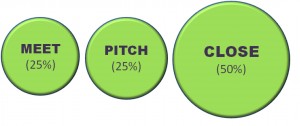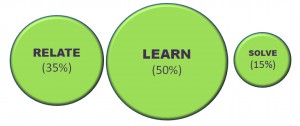Last week one of my close and respected sales professionals, Chris Conrey, released his manifesto entitled “Post Modern Sales.” I have read it several times over and found it simple, insightful, and on point. I am a huge fan of people who can get to point quickly and clearly without blathering all over the place and I admire this work for its efficiency and clarity.
I encourage you to take the time to read it and carefully assess your behaviors and sales process as it relates to the four shifts or transitions. It is the first transition that is the focus of this post: “Relationships and interactions over transactions.”
All too often I am still observing a sales behavior that emphasizes a ‘getting to the deal’ mindset. I recognize that depressed revenues and a shrinking market put increased pressure on making the most out of perceived business opportunities. However, there are still too many transactionally based behaviors that are actually inhibiting growth, rather than enhancing it.
 In the following graphic we see that most transactional relationships are still centered around: Meet, Pitch and Close. In this process around 50% of our time and energy is wasted on close tactics — negotiation, overcoming objections, sales manipulation, chasing after the prospect after we deliver our proposal. The inefficiency of this process is the amount of time spent chasing after a client to convince them to buy, rather than investing an appropriate amount of time learning and building a more impactful business relationship.
In the following graphic we see that most transactional relationships are still centered around: Meet, Pitch and Close. In this process around 50% of our time and energy is wasted on close tactics — negotiation, overcoming objections, sales manipulation, chasing after the prospect after we deliver our proposal. The inefficiency of this process is the amount of time spent chasing after a client to convince them to buy, rather than investing an appropriate amount of time learning and building a more impactful business relationship.
 The graphic to the left illustrates the differences is where the time is spent. In the Relate, Learn, Solve model, the selling time is a productive process of learning, discovery, and relationship building. By the time a solution is presented to a prospect their interest, their confidence, and their sense of value in the business relationship is quite strong; 0r significantly improving and shortening the close process. In this scenario little time is wasted chasing and all time is productively invested in building strong, lasting business relationships.
The graphic to the left illustrates the differences is where the time is spent. In the Relate, Learn, Solve model, the selling time is a productive process of learning, discovery, and relationship building. By the time a solution is presented to a prospect their interest, their confidence, and their sense of value in the business relationship is quite strong; 0r significantly improving and shortening the close process. In this scenario little time is wasted chasing and all time is productively invested in building strong, lasting business relationships.
I continue to press with this relationship model as I still hear and read a lot of the right noise regarding the concept; yet, I still have not observed enough professionals working the steps to do this effectively. The purpose of the graphics are designed to visually drive home the point where your time, energy, and focus needs to be if you are going to be a great relationship builder and professional resource for your clients. Hope this helps!
